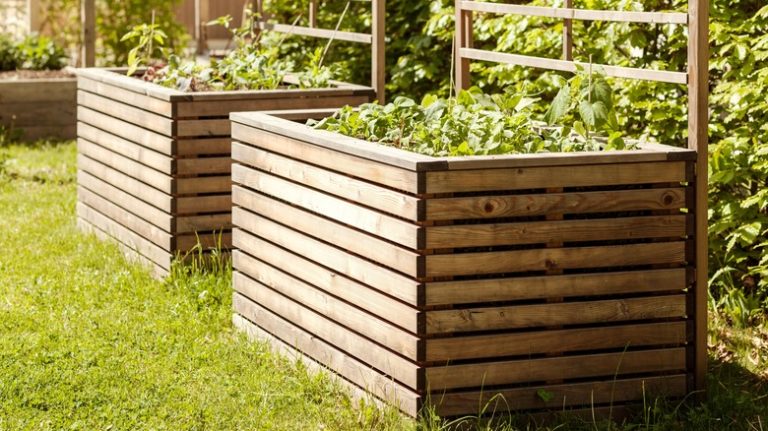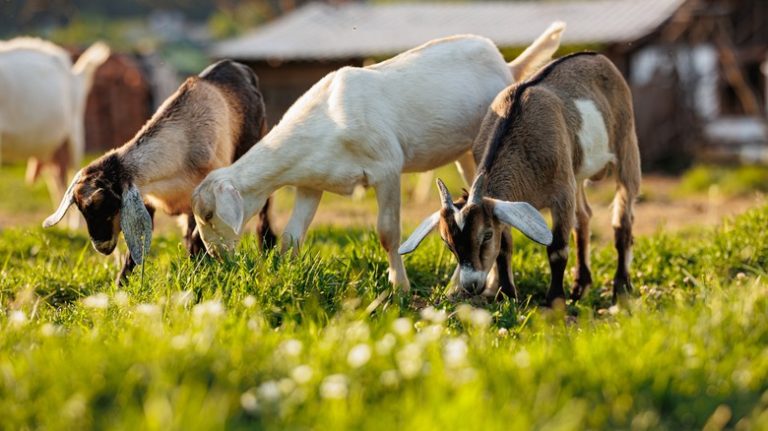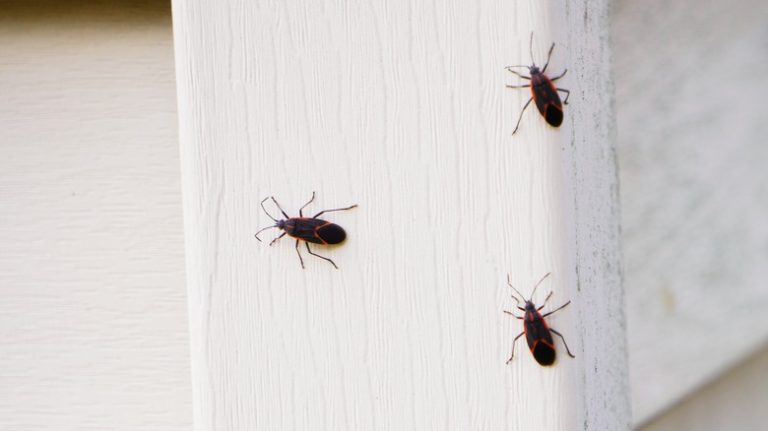The clover is easily one of the most underrated plant additions to the lawn among homeowners. There are many different species of this lawn option that exist in nature, per American Meadows. The plant acts both as a cover crop and flowering extra to the yard, making it a versatile option that can be sown in a rainbow of colors and across many soil types and climate zones.
Baker Creek Heirloom Seeds reports that clovers are also essential to maintaining a healthy nitrogen balance in the soil, making for a lawn addition that actively participates in the fertility and health of your yard and garden. What’s more, no matter what kind of clover you might be thinking of adding to your lawn, planting the crop from seed is incredibly affordable. From the value that the plant brings in terms of natural soil addition to the beautifying element that its springtime flowers add to the landscape of your yard, the benefits of planting clover interspersed throughout your lawn are wide-ranging and immensely positive. While it can be planted exclusively as a substitute for grass, One Earth recommends a clover to grass blended ratio of 1:4 for a healthy and vibrant yard that enjoys the best of both lawn plants.
Clover lawns improve soil fertility
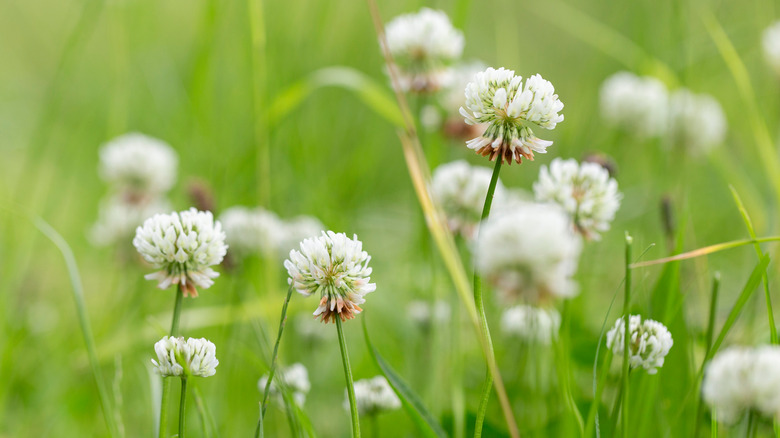
The clover is unique in that it provides enhanced fertility and nitrogen content to the soil. How? Garden Organic reports that clovers fix nitrogen from the air into the ground through their root nodules. This offers a natural fertilizing effect that maintains your soil’s health and balance in a meaningful way. In the same way that earthworms provide natural aeration and organic decomposition (slowly generating rich compost from organic materials present in the soil itself), the clover offers an organic and automatic solution to increased fertilization needs.
Another important benefit that the clover provides is serious staying power in even the most active garden spaces. On that end, Garden Organic reports the clover is highly tolerant to trampling, grazing, cutting, and other molestations of the growing medium. In addition, clovers perform admirably throughout both the flowering and colder seasons (as a leafy grass-like crop when not in bloom), and can tolerate excessive wear in the same way that a traditional grass lawn does.
Organic Plant Care treats clover as a weed but suggests that it can make for a healthy addition to your lawn’s overall makeup when maintained somewhat sparingly. Specifically, this is because it offers a visual indication that nitrogen levels are depleted in your soil. While grass will start to die off, clovers act oppositely, thriving when nitrogen drops while adding naturally to the balance.
Clovers suffocate weeds and make for a greener lawn
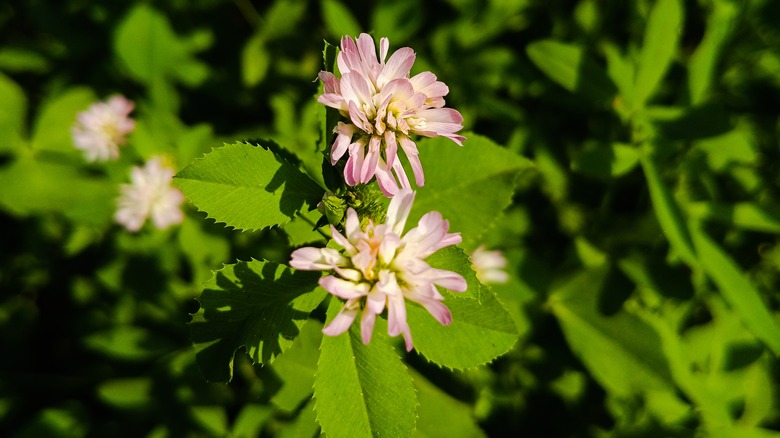
Family Handyman reports that the clover was once a staple component of lawn seed mixtures. Still, it can’t survive the application of weed killer that eventually became the norm in American yard care — transforming its cultural significance from something of benefit to a common lawn weed. Den Garden recommends planting clover as an integrated component of your grass-based lawn because it requires little watering, no fertilizer, and kills off weeds with ease. The thick and deep root structure a clover plant cultivates descends beyond the root layer of your grass, meaning that it won’t compete with the grass itself. However, it serves as a barrier that won’t allow the establishment and creep of other weeds that quickly become a nuisance in the yard.
As well, even if you consider clover a weed itself, it’s a different sort of plant than other types that are often thought of as the scourge of a healthy lawn. The weed control that clover provides is potent and, most importantly, natural. This will take the pressure off you as the homeowner, allowing you to enjoy your yard more fully without spending countless hours scouring the yard for weeds that you must pull out. Moreover, the foot feeling of the leafy texture of clover is akin to a soft zoysia grass (named as one of the softest types in use by American Lawns), making it an excellent addition to a garden or yard where summers are dedicated to quality time in nature.
Clovers add a unique beauty to your home’s landscape
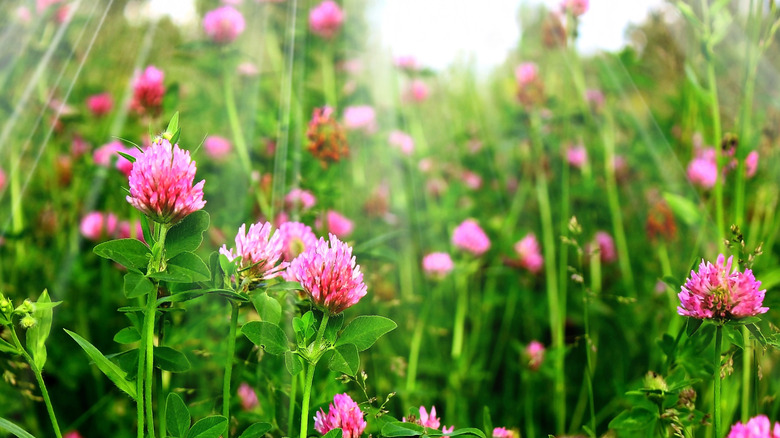
SakSa/Shutterstock
Besides the soft texture, weed control, and nitrogen-enriching capabilities of clover in the yard, this plant also acts as a simple beautification measure that will enhance the look of your lawn in a unique way that’s sure to turn heads. As One Earth reports, the long root structure the clover develops helps it to remain green and luscious throughout the winter months.
The natural benefits that clover cover crops bring to the front make the plant a kind of natural mulch that can be grown in unused raised beds during the colder season to prepare the soil for the increased workload of growing new yield in the spring. In addition, the vibrant green shade and leafy structure of the clover make it a fantastic addition to any yard. When the flowering begins with spring (via SFGate), it will transform your yard from a typical green patch to one that surprisingly incorporates a variety of tiny flowers that add depth and texture to the beauty of your lawn and home.

